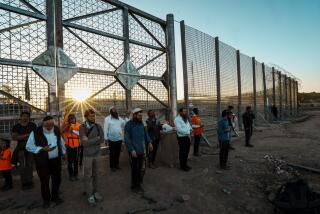Palestinians make risky gambit for statehood
Palestinian leaders are embarking on a risky statehood strategy that will seek to isolate Israel’s hawkish government in the international community and rely less on U.S. backing, a move that reflects growing disappointment here with the Obama administration.
The campaign will include U.N. resolutions such as one proposed last month on Israeli settlement building, boycotts against Israeli products, complaints in international courts and attempts to win formal recognition from as many countries as possible, Palestinian officials say.
They hope the effort will culminate this September in an internationally backed proposal for membership in the United Nations or a resolution recognizing a Palestinian state, even if it means invoking an obscure rule to circumvent the threat of a U.S. veto at the U.N. Security Council.
“We have moved into the internationalization stage,” senior Palestinian official Nabil Shaath said in an interview.
The strategy is a long shot, no question. It risks alienating the United States, a longtime ally of Israel and also the major financial backer of the Palestinian Authority. Israelis are certain to fight back and are already dismissing the campaign as a ploy to bypass the negotiating table and unilaterally win statehood.
Yet at the same time, Israeli Prime Minister Benjamin Netanyahu’s insistence on expanding settlements in the West Bank has alienated many of Israel’s allies over the last year, making the country more vulnerable to attempts to isolate it on the international stage.
The Palestinians’ effort may already be drawing a reaction. Under pressure from the international community to show that Israel is making a good-faith effort to restart talks, Netanyahu is considering launching a new initiative in coming weeks that would offer Palestinians a provisional state with temporary borders, Israeli officials say. Palestinians have long rejected such interim peace plans as insufficient.
The biggest move so far in the Palestinian effort was last month’s proposed Security Council resolution condemning Israeli settlements in the West Bank as illegal. The Obama administration lobbied hard against the resolution, saying it would only heighten tensions. In a 50-minute phone call, Obama warned Palestinian Authority President Mahmoud Abbas three times about “repercussions,” Abbas aides say.
Abbas defied U.S. pressure, and the U.S. vetoed the measure at the Security Council. But even in defeat, Palestinians said they had crossed a fear barrier of sorts and now feel emboldened to take their campaign to other international forums.
The next step will come later this month, when Palestinians turn to the so-called Middle East Quartet, comprising the U.S., U.N., Russia and European Union. They hope to extract a public commitment for the first time that any peace deal be based on borders that existed before Israel seized the West Bank and Gaza Strip in 1967. Netanyahu, who rejects the 1967 borders as a basis for talks, is reportedly boycotting the meeting.
Meanwhile, the Palestinians are circling the globe to make their case. With formal recognition of statehood from 112 countries, including eight South American nations during the last few months, they aim to have as many as 150 countries recognizing them by September, including, they hope, Spain and Britain, said Riad Malki, the Palestinian Authority foreign minister.
The goal, Malki said, is to use the international momentum to win membership in the U.N. and then ask the international body to help impose a solution on the parties.
To overcome a possible U.S. veto at the Security Council, Palestinians say they plan to take their case to the U.N. General Assembly, where they believe they would have a majority of the votes. To give the resolution more teeth, they plan to invoke U.N. Resolution 377, which allows the General Assembly to approve binding, albeit harder to enforce, resolutions in the event of deadlock at the Security Council.
“No question we’re getting more assertive,” Malki said.
A senior Obama administration official, however, called the Palestinian approach “a strategic mistake. It’s not going to be a successful strategy. Lining up countries to recognize a Palestinian state is not a substitute for successful negotiation with the Israelis. You’re not going to solve the challenge of Jerusalem in Buenos Aires.”
It’s not the first time Palestinians have turned to the international community, but officials say past efforts have been less effective because peace talks were underway at the same time.
“Whenever there’s been an opportunity for serious talks, we’ve tried our best not to be adversarial in our international actions,” Shaath said. “But when you lose hope and nothing serious is happening, that’s the time you can become more adversarial.”
The Palestinians have grown increasingly disenchanted with the Obama administration, which they say started out strong in 2009 by demanding that Israel halt all construction in the West Bank. But in December the administration formally backed away from that stance and last month stood alone in vetoing the U.N. anti-settlement resolution.
To many senior Palestinian leaders, who in recent years have held out U.S.-brokered peace talks as the only option for achieving statehood, the vote was the strongest signal yet that the administration is unable or unwilling to deliver.
“We are going through a major turning point, away from the period that was characterized by the belief in the primacy of negotiations,” said Palestinian pollster and analyst Khalil Shikaki. “For many Palestinian elite, the U.S. veto was the last straw.”
The U.S. official, who spoke on condition of anonymity, rejected assertions that Washington wasn’t trying hard enough. “The challenge right now is not a lack of U.S. interest,” the official said. “It’s the inability of Israelis and Palestinians to commit to a negotiation without having one issue or another interrupt.”
The new Palestinian strategy is also an attempt by Abbas to prove to an increasingly skeptical Palestinian public that he has a Plan B. Alarmed by the regional unrest in the Arab world, Palestinian leaders over the last month have made a series of surprising announcements, including a call for national elections and a Cabinet reshuffling, which some critics say are signs of desperation.
“It seems they are scrambling and don’t really know what they’re doing,” said Diana Buttu, an analyst and former Palestinian Authority negotiator.
Others warn there are no guarantees the statehood strategy will change the situation on the ground.
“Let’s say they declare a state in September,” Shikaki said. “How does this in any way change the situation for Palestinians living under occupation?”
U.S. officials have come out against taking the conflict to the United Nations. Deputy Secretary of State James Steinberg told lawmakers in February that the U.S. was working to block the Palestinian campaign to win recognition from other countries, calling such moves “counterproductive.”
Israelis have also threatened to retaliate against Palestinians should they escalate their international activism. Among other things, Israel could increase the number of military checkpoints in the West Bank, tighten borders, ramp up settlement construction or withhold tax revenue, officials said.
But Palestinians predict such punishments would backfire.
Said Shaath: “Anything they do will only bring the wrath of the world against them and make it even more difficult for the U.S. to stand by them.”
Times staff writer Paul Richter in Washington contributed to this report.
More to Read
Start your day right
Sign up for Essential California for news, features and recommendations from the L.A. Times and beyond in your inbox six days a week.
You may occasionally receive promotional content from the Los Angeles Times.






